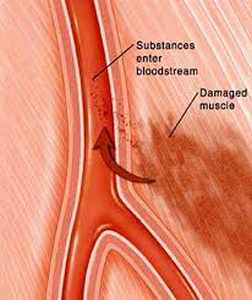

MedFriendly®


Rhabdomyolysis
Rhabdomyolysis is an acute (suddenly occurring) disease
that causes destruction of muscle tissue fibers connected to
symptoms are muscle weakness, tenderness, stiffness, and
aches. The destruction of muscle tissue leads to the release
of myoglobin into the blood and urine. Myoglobin is a protein
found in muscle that carries oxygen. Rhabdomyolysis can be
caused by a severe crushing injury to the muscles. Such
injuries typically occur in motor vehicle accidents, for
example. Another cause of rhabdomyolysis is polymyositis,
which is an infection of the muscles by a type of virus.
Rhabdomyolysis can also be caused by sudden kidney failure
due to heat stroke. The kidneys are two organs located on
each side of the spine, behind the stomach.
How the rhabdomyolysis
process occurs.
FEATURED BOOK: Muscle Disease: Pathology and Genetics
The kidneys filter (remove) wastes from the blood. Heat stroke is a life threatening
condition in which being exposed to too much extreme heat leads to an impaired ability of
the body to cool itself down. This causes the body to overheat. Rarely, rhabdomyolysis
can be caused by too much physical exercise.
Rhabdomyolysis can cause temporary weakness or loss of movement and sensation in
affected muscles. Unless the muscles are severely injured, they will usually grow back
and the condition will get better without treatment.
"Where Medical Information is Easy to Understand"™
However, rhabdomyolysis has been known to be deadly in severe cases. Rhabdomyolysis comes from
the Greek word "rhabdos" meaning "cell," the Greek word "mys" meaning "muscle," and the Greek word
"lysis" meaning "loosening." Put the words together and you get "muscle cell loosening."















